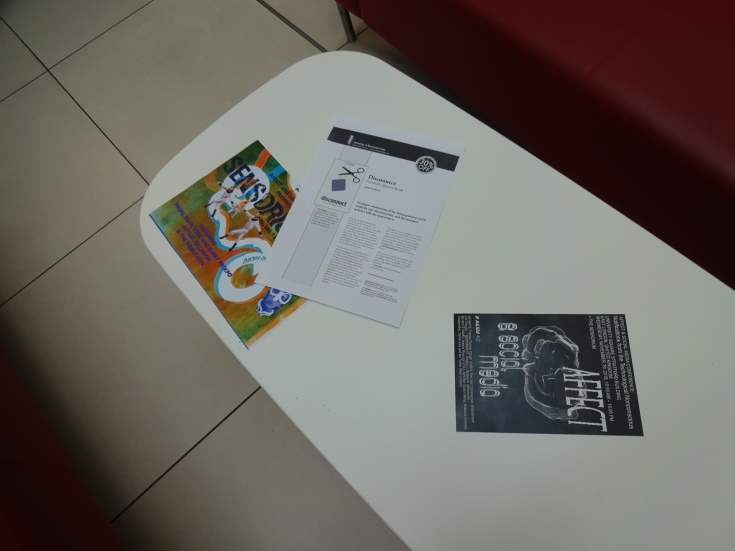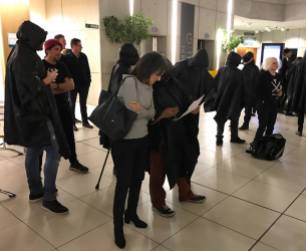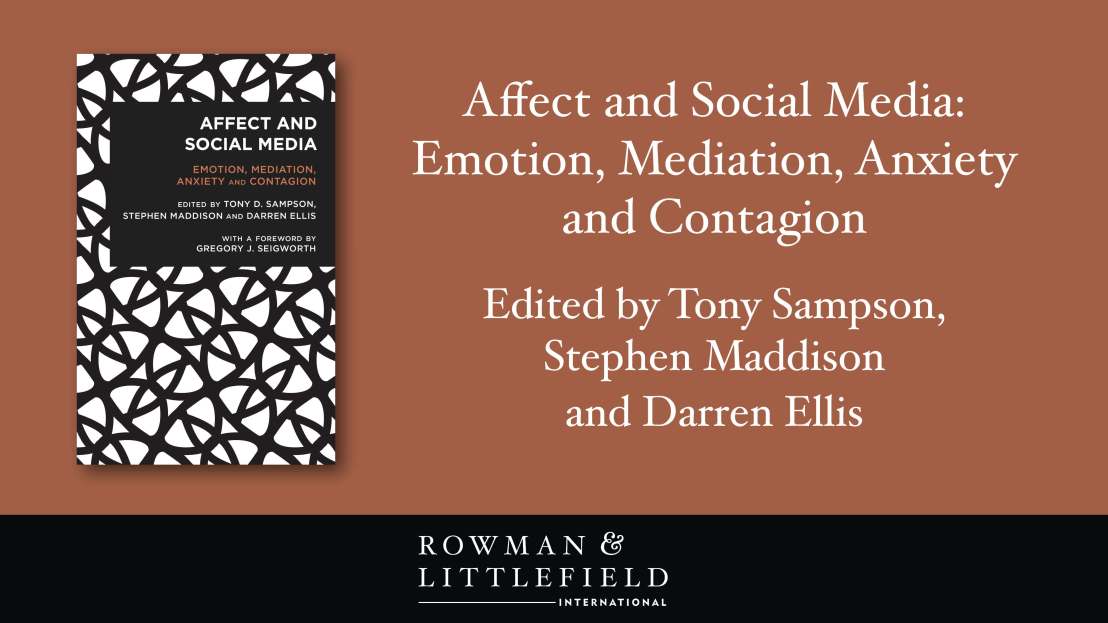Anarchive of A&SM#4
Images from A&SM#4 Nov 7th, 2018 at UEL’s USS Building in east London
Professor Kimey Peckpo keynote speech at the Affect and Social-media conference, as part of the Sensorium#4 Art intervention – University of East London Nov 7th, 2018. Special thanks to Gary Smith (typographic motion graphics) and Paul Greenleaf (additional audio Trumping section).
Archived Programme
(Select landcape mode if using a moble)
To mark the publication of the book Affect and Social Media (Rowman and Littlefield, 2018) we are very pleased to present a special A&SM#4 one day (free registration) conference.
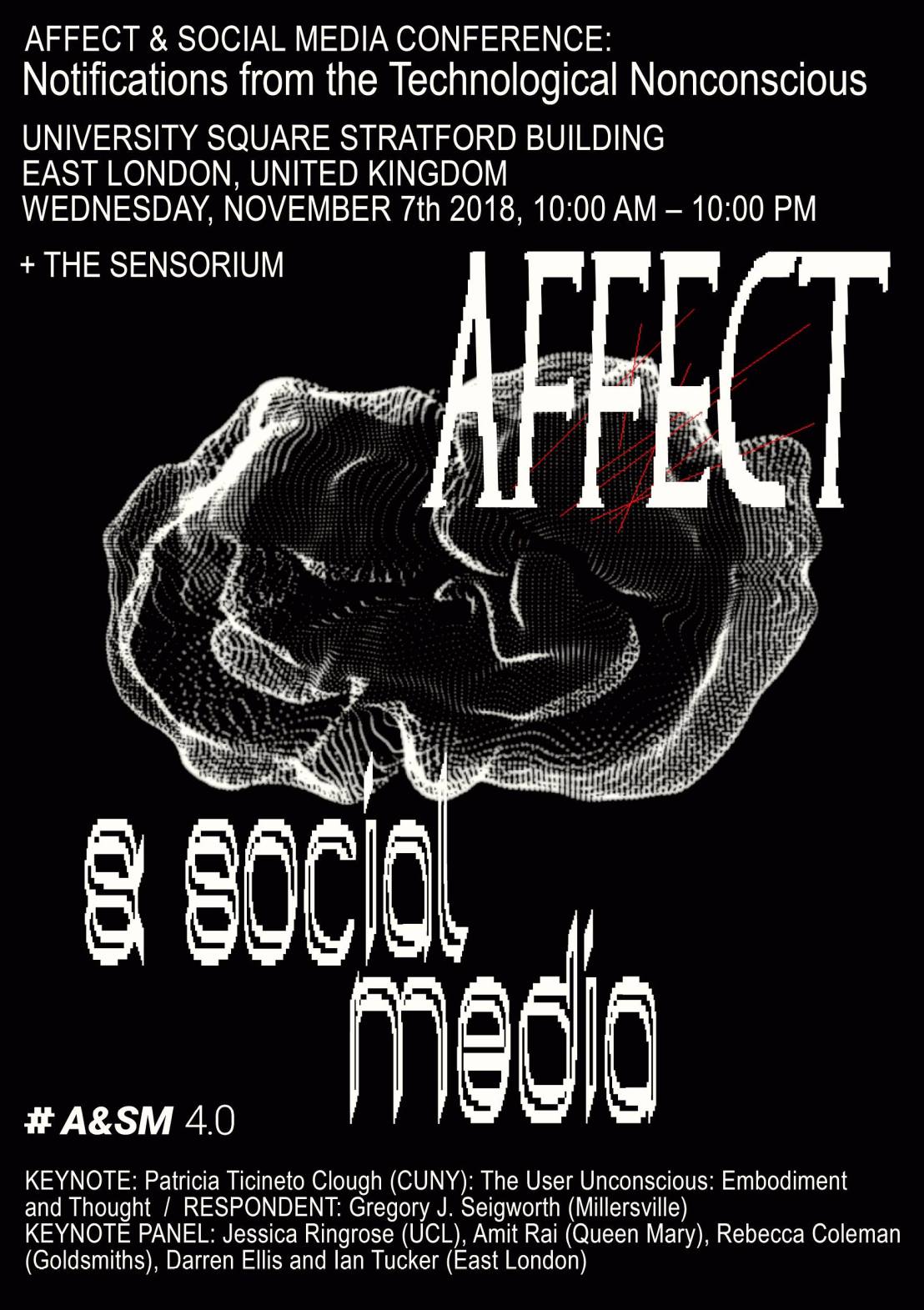
A&SM#4: Notifications from the Technological Nonconscious
Conference date: Wednesday, November 7th 2018
Venue: University Square Stratford Building, Stratford, east London, UK
Registration at USS reception opens at 10am
| Time. Location | Actual Occasion | ||
| 10.00-11.10am Entrance to the USS Building E15 1NF | Register and collect programme at USS reception
Please note that before entering the campus all attendees must register online at least two days before conference. Here’s a link to free registration: https://www.eventbrite.com/e/affect-social-media4-notifications-from-the-technological-nonconscious-tickets-46972453874 |
||
| 11.15-11.45
Room USG.17 Main Lecture Theatre |
Welcome to A&SM#4 with Tony D Sampson
Lisa Mooney, UEL Pro Vice-Chancellor (Research and Knowledge Exchange Stephen Maddison, co-editor of A&SM book and Director of Research in the School of Arts and Digital Industries In a social media environment awash with fake news and misinformation the Sensorium present Prof Kimey Peckpo, University of Aufklärung: Notifications from the Technological Nonconscious “As our social, cultural, political and emotional lives become increasingly entangled with fake news, hate speech, and misinformation on social media, it’s surely time to reflect” (Kimey Peckpo, 2018).
|
||
| Break 15mins: Visit the Rowman and Littlefield International bookstall. Tea and coffee will be available in the Foyer or in the coffee shop in the entrance to the USS building
|
|||
| 12-1pm
Parallel Sessions A Choice of three panels Panel 1: USG: 17 Panel 2: USG: 19 Panel 3: USG: 20 |
Panel 1 Chaired by Greg Seigworth
Camilla Møhring Reestorff (Aarhus University, Denmark) Affective Governmentalization: Backlashes again the #Metoo-movement in Denmark Heather Radwan Jaber (University of Pennsylvania, USA) Sexual harassment and social media in Egypt: Reorienting the resonance machine |
Panel 2 Chaired by Darren Ellis
Vered Elishar-Malka & Yaron Ariel (Yezreel Valley College, Israel) Social media, Legacy media, and the public, in the Trump(ing) era Suzanne van Geuns (University of Toronto, Canada) Rational Virtuosity and Religious Promise: Aspiring toward Jordan Peterson in Reddit Debates Fadi Safieddine, (Queen Mary University, UK) Factors contributing to the continuing failure in combating the spread of fake news on Social Media |
Panel 3 Chaired by Ian Tucker
Maximilian Stobbe, (Freie Universität, Berlin, Germany) My Reaction Can Be Summed up by the Guy at 2:23!” – YouTube Reaction Videos as Affective Practices Orsolya Bajusz (Corvinus University of Budapest, Hungary) The affective dynamics of online shaming and liberal moral outrage Fulla Abdul-Jabbar (School of the Art Institute of Chicago, USA) Why did you cry when you read that poem |
| Break 5mins | Find next panel | ||
| Parallel Session B
1.05-2.05pm Choice of two panels Panel 4 in USG: 19 Panel 5 in USG: 20
|
Panel 4 Chaired by Darren Ellis
Angie Voela (University of East London, UK) Fragile masculinities and contemporary psycho-power: The Case of InCel Ali Lara (University of East London, UK) Affective Modulation in Positive Psychology’s Regime of Happiness Trenton Lee (University of Westminster, UK) Feeling the Burn: Effect of Digital Capitalism on the Mental Health of Creators |
Panel 5 Chaired by Stephen Maddison
Sarah Cefai (London College of Communication, UK) Stupid in the Moment: Excavating the Patriarchal Nonconscious of Humiliation Annelot Prins (Freie Universität Berlin, Germany) How Much Do You Want To Meet Taylor Swift? The Cruel Optimism of Online |
|
| 2.05-3.05pm
In the Foyer |
Sensorium Two: The Actual Occasion – a silent disco with Mikey B Georgeson
There will be tea and coffee with biscuits available in the Foyer |
||
| Parallel Session C
3.05-4.05pm Choice of two panels Panel 6 USG: 19 Panel 7 in USG: 20
|
Panel 6 Chaired by Ali Lara
Antonia Hernández (Concordia University, Canada) The Simple, the Compound, and the Spurious: Assemblages of Bots and Humans on a Sexcam Platform Elena Pilipets (Alpen-Adria-Universität Klagenfurt, Austria) Sleeping with Netflix: The (Dis)Connected Body of Serial Binge Viewer Andreas Schellewald (University of Edinburgh, UK) Going down the algorithmic rabbit hole: approaching affective engagement in montage videos on social media platforms |
Panel 7 Chaired by Stephen Maddison
Vered Elishar-Malka, Dana Weimann-Saks & Yaron Ariel (Yezreel Valley College, Israel) The Secret Online World of Women: Intimacy and Exposure among Women’s Closed Facebook Groups Josie Barnard (Middlesex University, UK) The Multimodal Writer
|
|
| 4.05-4.15pm 10min break
|
|||
| Session D
4.15-6.45.pm in Main Lecture Theatre USG: 17 |
Keynote Session
Patricia Ticineto Clough: The User Unconscious: Embodiment and Thought
Audience Q&A Keynote Panel Opening response by Gregory J. Seigworth (Millersville) Keynote Panel Jessica Ringrose (UCL), Amit Rai (Queen Mary), Rebecca Coleman (Goldsmiths), Darren Ellis and Ian Tucker (East London) Audience Q&A with panel Chaired by Tony D Sampson |
||
|
7-10pm USG: 19/20 and USS Foyer |
Book launch with wine and sandwiches (sponsored by Rowman and Littlefield International and UEL) Sensorium Three and a special live performance by The Indelicates 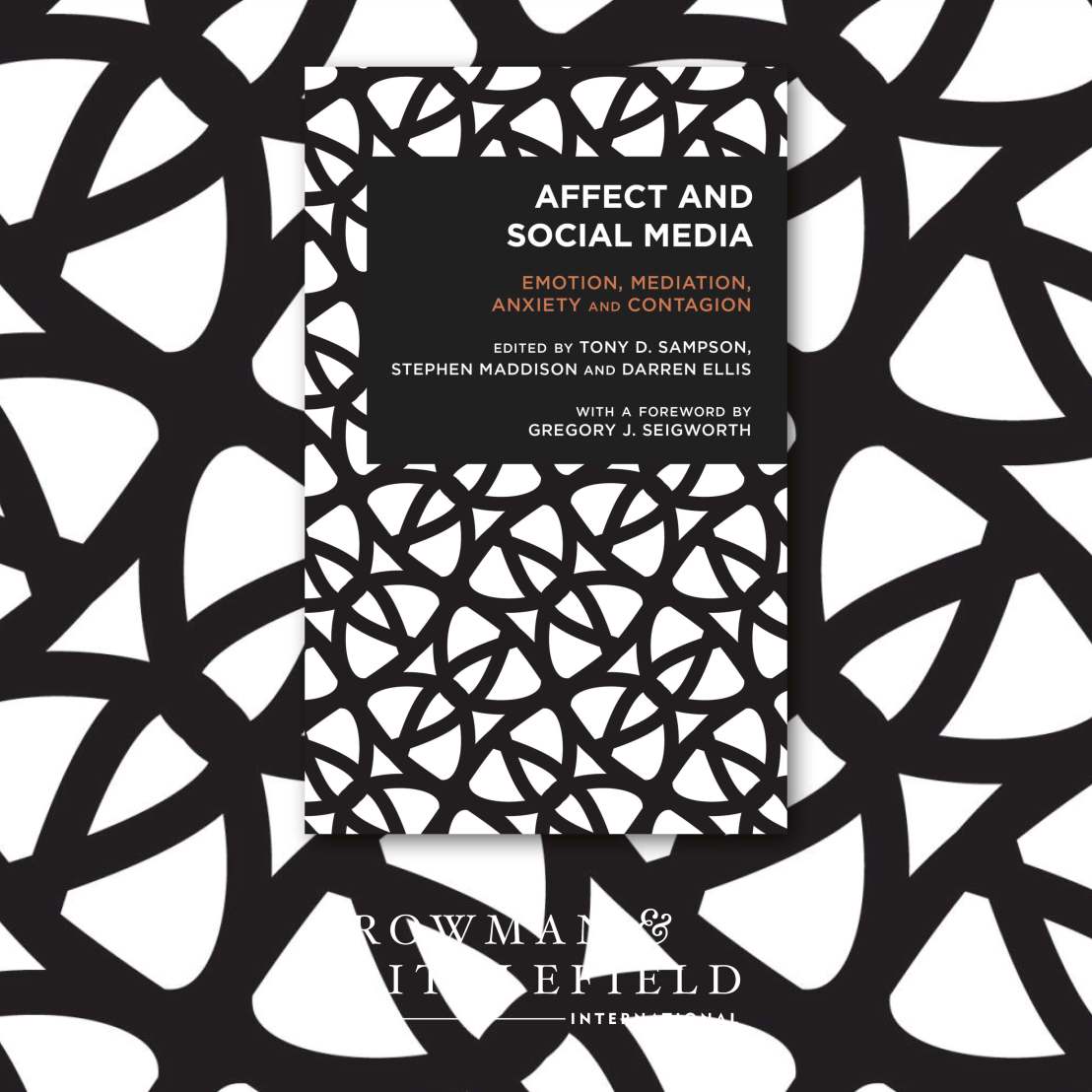  |
||
More details |
Our Keynote

Patricia Ticineto Clough is professor of sociology and women’s studies at the Graduate Center and Queens College, City University of New York. She is author of Autoaffection: Unconscious Thought in the Age of Teletechnology (Minnesota, 2000), Feminist Thought: Desire, Power, and Academic Discourse, The End(s) of Ethnography: From Realism to Social Criticism and The User Unconscious: On Affect, Media, and Measure. She is editor of The Affective Turn: Theorizing the Social with Craig Willse, editor of Beyond Biopolitics: Essays on the Governance of Life and Death, and, with Alan Frank and Steven Seidman, editor of Intimacies: A New World of Relational Life. Clough is also a psychoanalyst practicing in New York City.
Respondent

Gregory J. Seigworth is a Professor of Communication Studies at Millersville University. Greg has published numerous chapters, essays and reviews in a variety of venues, including Antithesis, Architectural Design, Cultural Studies, Culture Machine, Ephemera, m/c, Radical Philosophy and Theory, Culture and Society. He is co-editor, with Melissa Gregg, of The Affect Theory Reader (Duke UP, 2010) and co-editor of the open-access Capacious: Journal for Emerging Affect Inquiry with Mathew Arthur. Greg has also organized two fairly massive international conferences focused on the lively interdisciplinarity of affect studies (in 2015 & 2018) at his home institution in Lancaster, Pennsylvania.
Keynote Panel

Amit Rai is the author of Rule of Sympathy: Race, Sentiment, and Power (Palgrave: 2002). He has written on Indian masculinity in film, anthropologies of monstrosity, sympathetic discursive relations, and the swerves of media (clinamedia). His study of new media in India, entitled Untimely Bollywood: Globalization and India’s New Media Assemblage was published by Duke University Press in May of 2009. His blog on the history of media assemblages and the politics of perception can be found at http://mediaecologiesresonate.wordpress.com. He was recently in India on a Fulbright Senior Research Fellowship diagramming the perceptual mutations involved in gender identity and mobile phone networks in urban areas.

Jessica Ringrose is Professor of Sociology of Gender and Education, at the UCL Institute of Education and co-Chair of the Gender and Education Association. Her work develops innovative feminist approaches to understanding subjectivity, affectivity and assembled power relations. Recent research projects explore digital feminist activism, teen feminism in schools, and young people’s networked sexual cultures and uses of social media. Her books include: Post-Feminist Education? (Routledge, 2013); Deleuze and Research Methodologies (EUP, 2013); Children, Sexuality and Sexualisation (Palgrave, 2015); and she is currently working on two new books Gender, Activism and #FeministGirl (Routledge) with Professor Emma Renold, and Digital Feminist Activism: Girls and Women Fight back against Rape Culture (Oxford University Press) with Dr Kaitlynn Mendes and Dr Jessalynn Keller).

Ian Tucker‘s research focuses on the social psychological elements of social media, community mental health, emotion and surveillance. He has held grants from the EPSRC (Social Media and Austerity: Online Peer Support in Mental Health Communities) and The Mental Health Foundation (Transitions through the Lifespan: Older People’s Experiences of Community Mental Health). He is Core Member of the EPSRC Communities and Culture Network+, and Expert Member of the EU Cost Action Living in Surveillance Societies. Ian has published over thirty articles and book chapters, and has a book entitled ‘The Social Psychology of Emotion’ recently published for Sage (with Darren Ellis UEL).
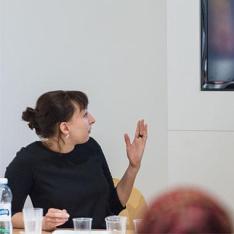
Rebecca Coleman is a Reader in Sociology at Goldsmiths, University of London and Co-Director of the Methods Lab. Her research focuses on visual and sensory culture, bodies, temporality (especially presents and futures), inventive methodologies and feminist and cultural theory. Recent publications include a special issue of Sociological Review, “Futures in Question” (2017, edited with Richard Tutton) and a special section of Theory, Culture and Society, ”Visualising Surfaces, Surfacing Vision” (2017, edited with Liz Oakley-Brown). Since 2018, her research focuses on a new project, “Mediating Presents: Producing ‘the Now’ in Contemporary Digital Culture” (funded by a Leverhulme Research Fellowship).

Darren Ellis is a Senior Lecturer and Programme Leader of Psychosocial Theory and Practice at the University of East London. His research on the social psychology of emotion and affect has ventured into a number of contexts, for example, in counselling practices, surveillance studies, police research and experiences of social media use. Presently, Darren is working with colleagues across the UK to develop a new psychosocial method concerned with empathies. He is the co-author (with Ian Tucker) of The Social Psychology of Emotion (Sage, 2015) and co-editor of Affect and Social Media (Rowman and Littlefield, 2018).
Panel Paper Abstracts
Panel One
Lisa Blackman (Goldsmiths, UK) Haunted Data
Haunted Data explores the concepts that are at work in our complex relationships with data. Our engagement with data – big or small – is never as simplistic or straightforward as might first appear. Indeed, our relationship with data is haunted with errors, dead ends, ghostly figures, and misunderstandings that challenge core assumptions about the nature of thought, consciousness, mind, cognition, affect, communication, control and rationality, both human and non-human. Using contemporary controversies from ‘weird science’ including the field of priming and its uncanny relations to animal telepathy, as well as artificial intelligences and their curious relation to psychic research (‘clairvoyant computers’), this paper shows how some of the current crises in science in these areas reveal more than scientists are willing or even able to acknowledge. In addition to proposing a new theory of how we might engage with data, Haunted Data also provides a nuanced survey of the historical context to contemporary debates, going back to the 19th Century origins of modern computation and science to explain the ubiquity and oddness of our data relations.
Camilla Møhring Reestorff (Aarhus University, Denmark) Affective Governmentalization: Backlashes again the #Metoo-movement in Denmark
Since 2017 #Metoo, demonstrating sexual harassment and abuse, has spread rapidly. #Metoo visualizes abuse and manifests as a type of spreadable social media activism that seeks to attune (Massumi 2002) bodies to the same event and make them feel the effects of abuse. However, the accounts of abuse are not simply accepted. In this paper, I will therefore study ways in which #MeToo has been challenged in Facebook-posts made by the Danish public service broadcasters DR and TV2 and comments made by their followers. The collected data shows that women are e.g. repeatedly accused of being “hysterical bitches” who “play the victim card”. In order to understand this depolitization I study how social media shape everyday sociality (Karatzogianni & Kuntsman 2012), alters how we perceive of broadcast news, and transform the affective governmentalization (Reestorff 2017) of #MeToo. In prolongation of this I analyze the complex feedback loops between news media, social media, and users in order to understand how social media crisscrosses between deliberative democracy and the user unconscious (Clough, 2018). Affect is governed in this meshwork. The paper thus studies the affective intensifications that occur when FB-users engage with #MeToo and each other. I thus stipulate that news sites on social media are a battle ground in which participants struggle to govern which affects are appropriate in relation to which bodies. However, when certain affects, e.g. empathy, are not “allowed” to stick (Ahmend 2013) to certain bodies, it renders it difficult for the women who shares #Metoo accounts to be recognized as legitimate political players in the production of new feminist ideologies.
Heather Radwan Jaber (University of Pennsylvania, USA) Sexual harassment and social media in Egypt: Reorienting the resonance machine
This paper explores two case studies around Facebook-live videos recorded and published in May of 2018 by two women, one Lebanese and one Egyptian, detailing their experiences of sexual harassment in Egypt and criticizing the state. Following the spread of the videos across social media platforms, both women were detained by Egyptian authorities and their videos were removed from their original sources. These videos were readapted, reframed, and reproduced by a variety of social media users, including news organizations and bloggers, linking the women to anti-state movements and projects seeking to cause instability within the nation. These events can be understood through the notion of territorialization, deterritorialization, and re-territorialization (Deleuze, 1980), whereby particular affective configurations are re-oriented in an effort to stabilize, fix, and prevent the formation of certain assemblages (Hipfl, 2018). In this way, assemblages which point toward a shadow actor attempting to destabilize the nation draw upon a particular “sensualized epistemology” (Berlant, 2011, as cited in Schaefer, 2017 p. 63) that already knows of the injustice wrought by imperial legacies and takes hold of it like a familiar friend, puts it out into the world, and lets it grow into what Connolly (2008) has termed a “resonance machine” (p. 7). The exploration of these videos and their resonances highlight the affective mechanisms working to re-orient the reverberations of potentially unstable assemblages.
Panel Two
Vered Elishar-Malka & Yaron Ariel (Yezreel Valley College, Israel) Social media, Legacy media, and the public, in the Trump(ing) era
Building trust through social media is the aspiration of every politician. In Israel, as in many other countries, senior politicians constantly accuse the Legacy Media of unprofessional biases against them, a phenomenon that seems to have grown in the Trump era. As part of these anti-media campaigns, politicians are investing more and more resources in direct communication channels with their potential voters, utilizing their private social media accounts (i.e. Trump on Twitter and Netanyahu on Facebook). This study examined the extent to which these anti-media accusations on the one hand, and the excessive usage of direct communication with voters, on the other hand, are met with social media users’ beliefs and political trust. Utilizing a representative survey of the population aged 18+, we examine news consumption in various media outlets, and particularly the patterns of user engagement in politicians’ posts. Findings indicate that there is a strong preference for believing in messages that stem from politicians’ social media accounts over Legacy Media news, among users who chose to follow at least one politician on social media. Moreover, exposure to politicians’ direct posts increases their trust in politicians even among those whose overall news consumption is at the highest degrees. Involvement with politicians’ messages is negatively correlated with age, and young users seem to have been abandoned media gatekeepers. In light of our findings, it seems safe to say that in the current Trump(ing) era, shifting resources to social media, while de-legitimizing legacy media might be an extremely efficient political strategy.
Suzanne van Geuns (University of Toronto, Canada) Rational Virtuosity and Religious Promise: Aspiring toward Jordan Peterson in Reddit Debates
Jordan Peterson’s followers agree: this man has changed their life. While the Canadian phenomenon may have acquired a god-like status among them, they emphasize that Peterson saves through science, not religion. On social media platform Reddit, the communities revolving around Peterson – ranging from ‘reading groups’ to ‘critical examination’ debates – do not consider themselves followers at all, but rather independent scientific thinkers encouraged by Peterson’s teaching. Setting aside critiques that rely on sharp Enlightenment divisions between religion and science (Latour 2010, 2005), I favor an ethnographic perspective that shows the Peterson corners of Reddit to function religiously, in ways that exceed both the frequent references to Christianity in his online content and the reverential treatment of Peterson’s person. Considering religion as that which ‘binds together’ immaterial truths and immediate physical reality (Engelke 2010; de Vries and Weber 2010; Meyer 2009), I show that Peterson’s followers on Reddit do not just consider the connections Peterson makes between their surroundings and overarching truths compelling in their dogma, but also exemplary in their construction. Peterson skillfully employs scientific language to bind these truths – about the mind, women, or the way habits work – tightly to his audience’s world. His charismatic performance of rational virtuosity, glowing with the sheen of science, presents an aspirational structure that I show to revolve around a (gendered) power fantasy (Foucault 1969; Clough 1992, 1998) whose contours emerge starkly in the gleeful discussion of videos in which Peterson ‘whips’ naysayers with truth, ‘making order out of chaos.’ Tracing the constant circulation of claims to science and debate in Reddit discussions of Peterson content, this paper interrogates Peterson’s promise of power as a specifically religious activation: learn to access and employ truths, and it will change lives.
Fadi Safieddine, (Queen Mary University, UK)
The use of social media has expanded over the last few years to become a key medium of news for many users. Information shared online by many social newsgroups lacks basic verification and accountability of the source. And while there have been some attempts to combat the spread of misinformation, we are still getting grips at understanding the variables that contribute to the success at spreading so fast. The spread of misinformation, also called fake news, resembles the spread of disease and having tools to verify and validate sources representing the medicine that could potentially be the cure. Over the past three years, we have used the big-data simulation tool Biolayout Express to simulate and publish our findings on the variables affecting the spread of fake news. We have found the only factor contributing to the continuing failure to combat this spread is the lack of validation tools. Recently, Google and Facebook have made attempts to develop fact-checking tools that rely on third-party fact checkers; we present our assessment of such tools based on 3D simulates and Information Quality (IQ) assessment. The results show some reduction in the spread of fake news and an improve IQ, but the ability to combat the spread remains limited and hampered by the slow response of third-party fact checkers. Our simulations show that a semi-automated approach to fact-finding, dubbed ‘right-click authenticate’, that allows the user to get a faster indication of the validity of the information remains the most efficient and effective option.
Panel Three
Maximilian Stobbe, (Freie Universität, Berlin, Germany) My Reaction Can Be Summed up by the Guy at 2:23!” – YouTube Reaction Videos as Affective Practices
In this paper, I examine the affectivity of the fairly young but immensely prolific phenomenon of the ‘reaction video’. This refers to the ongoing trend of filming, posting and commenting on the immediate (and usually initial) reactions of diverse recipients to popular media texts, mainly via YouTube. The recorded subjects often display intensely affective responses (e.g. shock, disgust, laughter, tears, or paroxysms of delight) to the primary content. In turn, the responses can themselves gain incredible popularity online and, particularly regarding long-running serial reactions, generate new affective collectives and even addictions to specific ‘reactor’ channels. But from where does this sharing of intensely felt responses to both fictional and non-fictional media texts derive its addictive, and affective, quality? Given that research on the reaction genre is still rather limited and exceedingly focused on its voyeuristic or sadomasochistic dimensions (see Middleton 2014) – while also making restricted use of the interdisciplinary insights which the ‘turn to affect’ has provided – I seek to foreground the reaction video genre’s understudied potential for affective connectivity and intersubjectivity. To this end, I will synthesize approaches to affective practices, reality TV’s (re)mediations of affect, and mediations of intimacy on YouTube. Focusing on the self-proclaimed ‘reaction community’ surrounding HBO’s Game of Thrones (2011–), I characterize the forms of online engagement with this genre as potentially magnetic ‘affective practices’ in Wetherell’s sense (2012). This will hopefully produce a more rounded perspective on the affective dynamics of YouTube reaction videos and help to explain the genre’s appeal and success.
Orsolya Bajusz (Corvinus University of Budapest, Hungary) The affective dynamics of online shaming and liberal moral outrage
This paper looks at instances of online shaming within a complex network of media hosting the interplay of various actors. My argument is that openly sadist trolls do only the ‘dirty work’, but the triggers are often through dehumanising discourses framed within moralist liberal agendas, wherein the subjects’ otherness and moral inferiority is explained, as the subject is shown to deviate from liberal-bourgeois social norms. I look at the affective dynamics of such moral outrage, and within it the utilisation of displays of pity, hand wringing, fake compassion, or the call for interventions such as psychotherapy and how these passive aggressive affects trigger further actors through the dehumanisation of their subject. I focus on mostly visual media and its commentary, photographs of subjects and the adjacent descriptions. Those framing and narrating such outrage do political work by relegating issues concerning difference and antagonisms to the moral domain (see postpolitics, Chantal Mouffe). I try to describe some of these discursive strategies. I conclude that the treatment of difference is the core issue- those outside the liberal consensus about social norms have their autonomy and humanity stripped away. Through this gesture online shaming becomes a matter of stomping out “moral wrongness”, so there is no need for remorse for those partaking and performing the codes of their own superiority. I draw comparisons with internet porn and military drills- as means of setting triggers and lowering thresholds.
Fulla Abdul-Jabbar (School of the Art Institute of Chicago, USA) Why did you cry when you read that poem
This performance is composed to mimic the space between a structure’s boundary and expressive possibility. Interspersed silences allow the audience’s gaze to shift fluidly between the performer, the screen, and the surroundings. The audience member’s wandering thoughts thus interact with the abstract image on the screen in a way that builds continuous and evolving associations for the viewer. This performance is interested in how the moment when you exert unfamiliar pressure on a structure, its irrationality reveals itself to us. It’s the lines of structure—be it poetry, the body, the voice, or PowerPoint—that, once we move them, in return move us, sometimes to tears.
Panel Four
Angie Voela (University of East London, UK) Fragile masculinities and contemporary psycho-power: The Case of InCel
The rise of InCel (involuntary celibates) in cyberspace and the misogynistic violence it inspired in Toronto, in the Spring of 2018, are not manifestations of private madness. They are phenomena directly related to shifts is the organisation of the collective psychic and social (virtual or ‘real’) space. The present paper examines InCel as the product of a necrotic neoliberal simulacral culture. Drawing on the works of thinkers like Baudrillard and Berardi, I discuss InCel in terms of: a) an atrophy of sensibility directly analogous to an obsession with potency and impotence; and b) the desire for an event in a largely ‘eventless’ social universe. Phenomena like InCel also invite us to re-examine way in which we theorize the psychic potential of cyber-cultures, by mapping desire onto a system of signs which, in their virtuality/materiality, promise to address the lack of being denied and foreclose by contemporary capitalism.
Ali Lara (University of East London, UK) Affective Modulation in Positive Psychology’s Regime of Happiness
This paper explores the affective consequences of the intersection between a ‘scientific’ discourse -the so called positive psychology- and a media platform – an app called Happify. On one hand, according to positive psychology, happiness is as measurable object of self-cultivation and psychological enhancement. On the other hand, the app Happify takes that scientific discourse to create programs and activities meant to improve the user’s happiness. Even when Positive Psychology has been the subject of numerous critiques, less attention has been paid to the ways in which specific media technologies derived from this ‘happiness turn’ have an influence on subjects’ bodies and embodied experiences beyond discursive means. In this paper, we explore the affective modulation of bodies engaging with this app. Our analysis consists on identifying and describing three mechanisms through which this media technology modulates the affective capacities of human bodies by producing preemptive habits to create what we have called the positive psychology regime of happiness. The three mechanisms of this app to be described are: the permanent not-yet-ness of happiness, the reduction of body’s emotional spectrum, and the organic production of habits.
Trenton Lee (University of Westminster, UK) Feeling the Burn: Effect of Digital Capitalism on the Mental Health of Creators
With the rise of social media and video-sharing platforms, the entertainment industry is undergoing a renaissance of intimacy between creator and audience. Since its launch in 2005, YouTube has hosted a community of content creators who express their creativity in an audio-visual format as a means to grow their audience reach. As of 2016, 37,000 YouTubers were able to earn a living wage from this precarious work. YouTube creators are proving their influence in the industry and advertisers are flocking to the digital content market. My PhD research is exploring how the parameters of the digital economy (specifically YouTube’s political-economic composition) is affecting how YouTube creators form and present their identities to their audience. However, one of the issues emerging from my research is navigating the effect of digital capitalism on the mental health of creators. The Guardian has recently published two articles outlining how YouTube’s creator community is “feeling the burn” (Stokel-Walker 2018) or are “heading for burnout” (Parkin 2018). The latter article poses the question: Why are so many YouTubers finding themselves stressed, lonely and exhausted? With preliminary findings from my ethnographic fieldwork of YouTube’s creator community, I argue that these “burnt out” feelings are a product of the single emotion of YouTube’s ranking algorithm which determines the visibility of creators, attention optimization.
Panel Five
Sarah Cefai (London College of Communication, UK) Stupid in the Moment: Excavating the Patriarchal Nonconscious of Humiliation
Approaching humiliation as an everyday structure of feeling, this talk links humiliation’s affective and discursive process of articulation to the nonconscious dynamics of a fully mediated—‘teletechnological’ (Clough 2000)—milieu. Stupidity, that culminates in the form of foolishness (having been duped, tricked, played, fooled) and the realisation of one’s being stupid (being made to look the fool), is the mechanism by which humiliation brings one’s status down. This paper explores the idea that being “stupid in the moment,” particularly as a failure to understand and respond to “what is going on,” is less a personal failing that is haphazardly realised or felt, and more a patterned response of non-response that iterates the epistemological shortcomings of patriarchal relations. By linking the “silence” of non-response to the aesthetics of humiliation, this talk hopes to politicise the social significance of humiliation, particularly, the affective anchoring of humiliation in the patriarchal social relations—in their automated, nonconscious capacities—that humiliation brings into play.
Christina Riley (George Mason University, Virginia, USA), The Affective Flux of Feminist Digital Collectives or What Happened to the Women’s March of 2017
This paper asks if and how the affective dynamics that occurred online during the formation of the Women’s March of 2017 influenced its material manifestation. I propose that this feminist collective’s affective dynamism online was informed by conjunctures where neoliberalism’s identitarian politics of redress abutted second wave feminists’ understanding of a more uniform version of collectivity. Drawing on affect theorist Sara Ahmed’s notion of affective economies as well as Deborah Gould’s work in Moving Politics, I hope to uncover how digital affect informs collective coherence, both on and offline, and how this creates space for a new sort of feminist solidarity. Specifically, I will analyze the march’s Diversity Statement as posted on their Facebook page as a cultural text to help decipher the affective currents of this feminist collective.
Annelot Prins (Freie Universität Berlin, Germany) How Much Do You Want To Meet Taylor Swift? The Cruel Optimism of Online
Fan Labour
As part of her 2018 Reputation Stadium Tour, Taylor Swift was the first artist who made use of a “boost the line” program wherein fans could compete with each other for a better spot in the online ticket sales line. Fans were rewarded for online fan activity, which varied from buying merchandise in the official fan shop to the sharing of, and commenting on, music videos. In addition, Swift, her parents and her management team handpicked active online fans on Twitter and Tumblr for meet-and-greets with the celebrity. This paper engages with the remarkable extent to which Taylor Swift fans are encouraged to stand out online in order to be rewarded with meeting her. I combine fan research with critical theory to grapple with the affective as well as addictive dimensions of being a Swiftie. Meeting Swift is an aspirational structure that functions as a striking example of the way music promotion today is working on, through, and with online fandom (Passman 2014, Meier 2017, Baym 2018). Ultimately, most fans were disappointed. Although over 1900 Swifties got to meet Swift during the tour, most fans did not get rewarded for their labor. Many expressed feelings of exhaustion, emptiness and sadness in the fan chat groups afterwards. Sara Ahmed’s notion of “happiness objects” (Ahmed 2010) and Lauren Berlant’s concept of “cruel optimism” (Berlant
2011) are employed to theorize how fan labor by Swifties can be understood as a process of collective hope, shaped by individual competition and addictive investments, and recycled through a shared disappointment that is ultimately always coupled with a consensus that no one is ready to let
go yet.
Panel Six
Antonia Hernández (Concordia University, Canada) The Simple, the Compound, and the Spurious: Assemblages of Bots and Humans on a Sexcam Platform
Camming websites, or sexcams, can be considered platforms for the laboring of affect: machines that exploit, accelerate and capitalize on it. This extraction does not only happen through the broadcast and availability of consumption of sexual performances but through the respect of some of the conventions of cammingas a genre, built upon the perception of authenticity and closeness between audience and performers. This presentation looks into one of the most popular sexcam platform, Chaturbate.com, and explores from there the mechanisms that sustain these notions when the exchanges between audience and broadcasters are accelerated and scaled. These mechanismsinvolve, as it will be outlined,humans, software, and some entanglements in between.In particular, this presentation examines the role of bots in the management of the social on Chaturbate. In contrast with other social bots, bots on Chaturbate are not autonomous entities but the performers, managing audiences of thousands of viewers, are not autonomous either. While these partially-human bots have been categorized as cyborgs (Boshmaf et al. 2011), this presentation proposes the use of the taxonomy of nineteenth-century automatons (Sussman, 1999) for a more nuanced observation of these assemblages.
Elena Pilipets (Alpen-Adria-Universität Klagenfurt, Austria) Sleeping with Netflix: The (Dis)Connected Body of Serial Binge Viewer
As various lifestyle technologies intervene in the networked framework of the digital attention economy, they stimulate and modulate intensive affective engagement on an everyday basis. For instance, Netflix CEO Reed Hastings has recently claimed that the streaming company’s main competition is sleep. In this paper, I inquire after the (dis)connective value of Netflix experience by situating the affective life of the viral hashtag “Netflix and chill” within the ephemeral and durational temporalities of today’s media entertainment. With the focus on the body of serial binge-viewer, I will first address its affective and cognitive workings as resonating with/contributing to Netflix’s playful promotional stance on active participation, personalization, and quality. In the next step, I will conceptualize the ways in which Netflix-specific viewing/using practices take on a dynamic of their own in visual social networks. Finally, I propose to re-think the addictive intensity of our binge-viewing attachments as embedded in the platformed logic of contact/capture.
Andreas Schellewald (University of Edinburgh, UK) Going down the algorithmic rabbit hole: approaching affective engagement in montage videos on social media platforms
In 2016, the then popular video hosting service “Vine”, which allowed people to create and upload six-second long looping video clips, announced its end of service. While popular among its 200 million active users, the Twitter owned platform faced financial issues due to lack of monetization, being economically outperformed by the innovations and developments of its competitors Instagram and Snapchat. But what happened to the 200 million users, their contents and cultural practices they evolved within the platform boundaries over the years? The paper is going to approach this question by looking at montage videos of old Vine clips distributed on YouTube. In a first step, the form of Vine clips as well as the montages is going to be considered. Herein, the paper will show how they nurture an affective, a sensually present experience of the world in acts of remembering and reliving what once was lived. In a second step, making use of a network analysis of the recommend videos surrounding these montages, the paper will explore the structural paraments within which such affective engagements take place. Doing so, we will show how going down the algorithmic rabbit hole of video recommendations, people are implicated in an audio-visual container of affective engagements. Discussing the value and ethics of such spatial settings, the paper closes by, firstly, arguing for a different assessment of the economic value of social media platforms through, secondly, outlining how they allow for the constitution of not a worldly but lively sensibility towards the self and human life in our digital times.
Panel Seven
Vered Elishar-Malka, Dana Weimann-Saks & Yaron Ariel (Yezreel Valley College, Israel) The Secret Online World of Women: Intimacy and Exposure among Women’s Closed Facebook Groups
One of the most intriguing aspects of the current social media landscape is the proliferation of closed multi-participants groups on Facebook. The current study explores the activities that take place within three multi-participants women’s closed Facebook groups. These groups are being activated by, dedicated to, and open exclusively to women: All three accept women of all ages, occupations, and life-styles. The purpose of this study is to learn about women’s’ usages patterns, perception of intimacy, sharing, support and self-disclosure, by examining the type of dynamic and discourse that take place within these groups. A quantitative content analysis was conducted to examine 1500 random posts that were written during January-May 2018 by members of the three groups. The most popular topics of the posts were health (15%), motherhood (13%), relationships with partners (12%) and sexuality (9. An overwhelming majority of posts (89%) included dialogical elements. Furthermore, in most (94%) of the posts, authors’ name, picture, and Facebook’s full profile were overt. A positive correlation was found between the level of personal exposure and the depth of discourse that followed. We also found a negative correlation between the level of personal exposure in the group, and the number of friends on the user’s personal page, a possible indication of the central role that these groups play in their users’ lives. Our study highlights the major role that closed women’s groups on Facebook play in members’ lives: a non-anonymous, yet extremely intimate space, where women may share, expose, support and trust one another.
Josie Barnard (Middlesex University, UK) The Multimodal Writer
With the exponential rise of computational media in the early twenty first century, the human-computer relation is, inevitably, changing. This paper considers how – with affect positioned centrally – such changes can enhance creativity and productivity. Based in the field of creative writing, it is hoped that the findings will be of use more widely. It adopts a teacher-practitioner stance to enable the consideration to be evidence-based. Adding new empirical data from a pedagogical pilot which was conducted at a UK University Oct 2017-April 2018, this paper builds on research into how writers can negotiate the opportunities and demands of a fast-paced ‘postdigital age’ (Barnard, 2017) which demonstrated that introducing paper and pencils (foregrounding touch, triggering memories, for example) can help students engage with and measurably benefit from otherwise daunting pedagogical tasks involving new media technologies (Barnard, 2017, pp. 10-12). Increasingly, the public and private selves we create via social media are so complex and intermingling that they reveal ‘a transmediated self constituted as a browsable story-world’ (Elwell, 2013) which should also be – to add a further challenge – ‘authentic’ (Adsit, 2015). The new empirical data provided by the 2017-2018 pilot study referred to enables consideration of how, specifically, affect can be applied to aid negotiation of the challenge Elwell (2013), Adsit (2015) and others highlight. Informed by an ongoing programme of research (represented by publications inc Barnard 2013, 2016, 2017, forthcoming), a key aim of the paper is to reach a new theoretical position on how affect can aid negotiation of the creation of multiple, transmediated selves that is now an imperative.
About The Sensorium
Artists Dean Todd and Mikey B Georgeson will be curating more Sensorium events at this year’s 4th A&SM conference. Expect more liminal performances, the Actual Occasion silent disco and live music at the Affect and Social Media book launch.
Live music from The Indelicates
About the Venue
University Square Stratford
University Square Stratford is ideally located in a thriving part of east London with excellent transport links.
http://www.universitysquarestratford.ac.uk/aboutuss.htm
Here’s an image of the Main Lecture Theatre at USS taken at a recent UEL research conference where the organizer of A&SM pitches it as a “critical interference” into the current interdisciplinary research agenda.
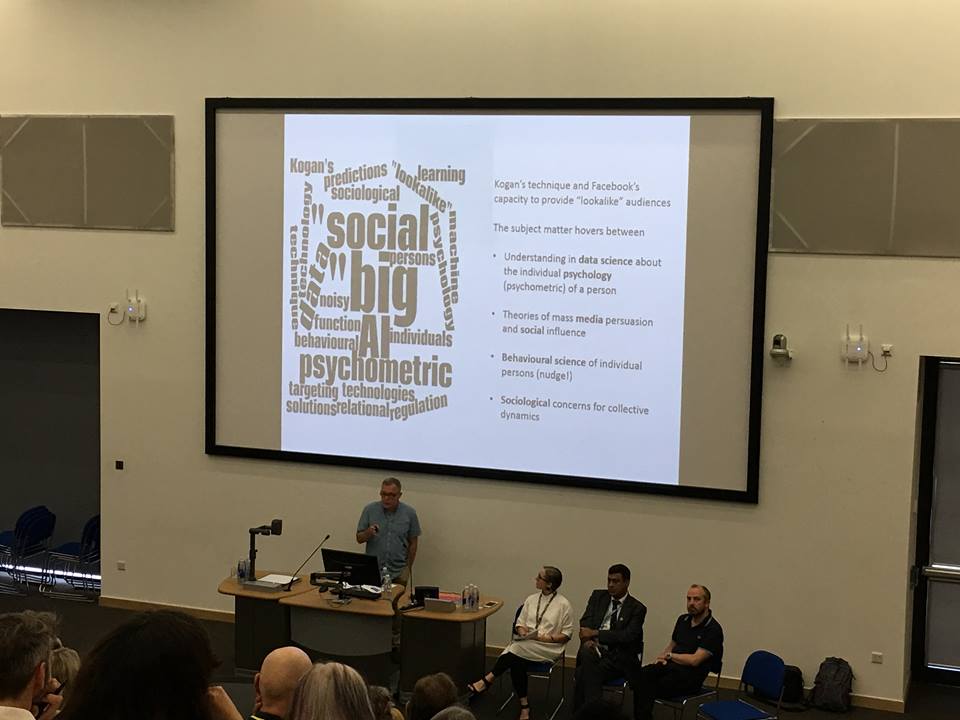
Inspiration for this year’s A&SM call for presentations
- Unthinking
The exponential rise of computational media in the early twenty first century has drawn much critical attention in the humanities to a seemingly paradoxical human-computer relation. On one hand, human thought is both contemporaneous with, and frequently outperformed by, the uber-cognitions of corporate computational media technology. There is, indeed, much concern expressed about the possible absence of human consciousness from the computational world it created (Hayles, 2017; Hansen, 2015). On the other hand though, it would seem that the thoughts, feelings, behaviours and experiences of social media users, far from disappearing, are, often by design, captured and nudged from here to there by an expanding yet mostly imperceptible technological nonconscious (Clough, 2000, Thrift, 2007, Grusin, 2010). What, if anything, is disappearing in the human-computer relation?
- Addicting
Computational media can no longer simply be defined through the operations of narrowly defined cognitive machines implicated in clandestine data harvesting and the manipulation of individual users through e.g. psychographic profiling. Social media is a “social” machine of capture that works on relations and shared felt experiences (Sampson, Maddison and Ellis, 2018), triggering habitual tendencies (Chun, 2016) that seem to produce mass media addictions (Bartlett and Bowden-Jones, 2017). As a major component part of the propagation of the technological nonconscious, social media is less defined today by the familiar ease of connection discourses of Web 2.0 than it is by the difficulty of disconnection (Karppi, 2018). Like other media of addiction (drugs, gambling, sex), social media hooks users in the event of the habit refrain, triggering subsequent emotional anxieties and contagions. Is social media addiction a problem of personal compulsion or collective masochism?
- Feeling
Computational social media is a feeling machine. It feels, or prehends, the event (Ellis, 2018). But this does not mean that it has feelings, in the sense in which humans feel. There are limitations imposed on the potential of affective computing to actually feel (Shaviro, 2015). Social media is constrained to the mere reading of sentiment data, and like an actor, it can feign expressions of human emotion, but cannot feel them. However, the operational level of computational media can learn, algorithmically, from emotional experiences. It can pass on, or transmit, feelings. It can plant a behavioural hook in the user experience. Social media has an affective tone or atmosphere through which the human-computer relation strives. Feeling the event is a different matter.
- Sleeping
Always on social media never sleeps! “Prolonged awakening, work without the limit of time, excessive light, surplus information… links… attentional capture” is the new Atopia (Neyrat, 2017). But the users of social media are often positioned as vulnerable, sleepwalking user-subjects: the user unconscious (Clough, 2018), the network somnambulist (Sampson, 2012, 2016). Like Crary’s (1999) earlier rendition of attentive analogue media subjects, the users of social media are simultaneously attentive and inattentive, and attracted and distracted by the fascinations of notifications, posts, tweets, likes, shares… This technological nonconscious, or Unthought (Hayles, 2017) human-computer relation is not unconscious, as conventionally understood.
- Dreaming
In The User Unconscious: On Affect. Media, and Measure (2018), Patricia Ticineto Clough argues that computational media networks have fundamentally affected what it means to be human. “We are both human and other-than-human.” This luminous text explains what it means to live, think, and dream from this “other-than-human perspective.” Here Clough moves to answer questions concerning the extent to which human lives are now animated in the multiple layers of these vast computational networks and how these layers radically transform our sense of self, subjectivity, sociality, and unconscious processes. How can we probe what it means to live, think, and dream through this newly animated technological nonconscious?
- Trumping
Who is to blame for Trump? Trump on Twitter may seem like the unpredictable personal opinions of a racist, sexist, xenophobe that infects a population, but the technological nonconscious, or thing-self of the user unconscious, as Clough points out, “transgress[es] the separation of the personal and the networked.” It is the “affective tone” of social media itself that made Trump possible! Social media has given expressive support to a kind of microfascist populism or “population racism” that is currently spreading everywhere. What will it take to out trump the collective impulse that is Trump?



















